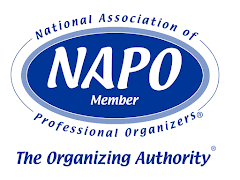When some people decide that they want to organize their home - they just start "organizing". They go out and buy some bins and baskets and put random things into these bins without having made some very important decisions.
Such as:
What am I trying to accomplish?
Do I have a specific place for this item to go?
Do I really want or need this item?
Do I have room for this item?
Is this item in good shape - or does it work or fit?
And one very important question that not a lot of people think about ---
What is the intended use of this room?
You don't start the "organizing process" by organizing - you start the process by decluttering first!
Start by picking up any trash (wrappers or other things thrown on the floor or left out instead of in the garbage).
Next - do a quick pick up of things that don't belong in the room and remove them from the room (anything on a kitchen island or dining room table that doesn't belong there).
Doing these two things will make a huge difference immediately.
But - then you need to take a step back and decide what it is that you actually want to accomplish. And you also need to decide what you want each room to function as.
Do you want the living room to be a room where the family watches TV or they play games or the kids do their homework?
Does your bedroom also need to function as your "office" (since a lot of people might still work from home)?
Do you want your kitchen to also be the place that the kids do their homework or that you use as your "office"?
Is your entryway closet going to be used as a coat closet or as a toy cabinet? It's your home - you get to decide how each room and each space will be used.
Once you decide how each room and each space will be used - then you need to start the planning process. Unfotunately, this is the step that most people skip over. Take your time and come up with a list of things that you migth need to make your project a success. This will save you time so that you aren't constantly running to the store or to different rooms to get something that you need. Get everything in place before you start.
Then you need to step back and really think decide if the way you set up the room (or space) is really working for you. If not - you need to figure out why. Move things to other areas or drawers. Consolidate all like items in one place. Whatever it takes to make it function better for you.
Start the organizing process by making these decisions before you start doing any organizing!
Good Luck and Happy Organizing!
Less Clutter = Less Stress SM in your home, your business and your life
Organizational Consulting Services
http://www.organizationalconsultingservices.com
.
Visit our Life & Business Coaching website: North By Northwest
*** check out the Products tab for self-paced workshops, planners and more....



